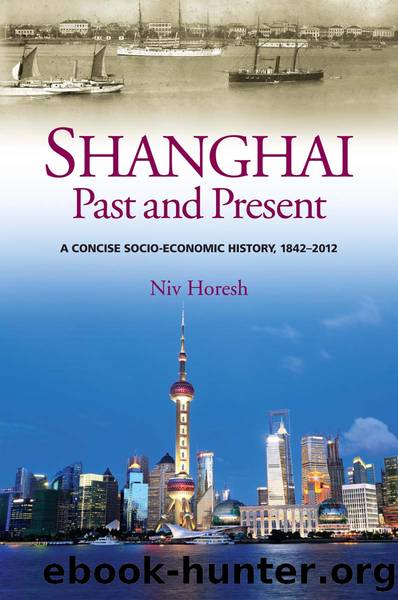Shanghai, Past and Present by Horesh Niv;

Author:Horesh, Niv;
Language: eng
Format: epub
Publisher: Liverpool University Press
Published: 2014-06-15T00:00:00+00:00
Public Debt Crowding Out Industrialization?
The entrenched notion that speculation in bonds was the bane of Shanghai pre-war finance is supported, to some extent, by Liu Zhiyingâs important 2004 study. Liu was not able to re-construct a time series of trade patterns in the cityâs Chinese-run bourse but, based on painstaking research at the Shanghai Municipal Archives, came to the conclusion that much of the activity there after 1928 revolved around KMT public debt. He estimated the volume of trade in 1931 at $3.7 billion, a total equivalent to just 2.3 times the amount of KMT government debt floated hitehrto.19
In order to control the Chinese-run bourse, the KMT eliminated diffuse trade, and created one venue for floor bidding on Hankou Rd. Prior to 1937, Chinese investors sceptical of the governmentâs ability to honour its bonds were drawn to Shanghaiâs foreign-run stock exchange, set up as early as 1891. Like its Chinese equivalents, this foreign bourse was often buffeted by speculative bubbles â but it managed to weather fleeting storms and grow fast in the early 20th century. By 1905, the foreign bourse in Shanghai was incorporated under Hong Kong law, primarily listing expatriate treaty-port firms and municipal utilities, tobacco and rubber plantations, coal mines and cotton mills.20
As early as 1872, the British-run Shanghai Municipal Council [SMC], the governing body, of the International Settlement, had issued its first tranche of bonds in the foreign-run bourse, offering 8% interest p.a. Subsequent floatations were made every year, and grew increasingly bigger. A few years later, the French Settlement municipal council followed suit with a floatation of its own. These two councilsâ bonds were enthusiastically taken up by the expatriate community. For example, when prominent Baghdadi-Jewish Shanghai businessman Sir Ellis Kadoorie died in 1922, it emerged that he had in his possession no less than 106,500 taels (hereafter, Tls) worth of Shanghai municipal-council debentures out of some Tls 376,175 in local securities (including corporate shares).21 Similarly, Tycho Wing was a prominent British lawyer residing in Shanghai; from his estate it emerges that upon his death in 1935 he held Tls 8,252 in French-council debentures out of a total of Tls 29,675 in securities (including corporate shares).22
By the 1920s, SMC annual bonds offerings had already made up around third of new SMC liabilities. The reason why the two foreign-run municipal councils increasingly took to bonds was simple: right from their establishment over half of municipal council income relied on Chinese rate-payers and licence fees paid in largely by Chinese-run businesses. Since these rates and fees were relatively hard to collect, and required an ever larger enforcement mechanism, bonds proved an attractive means of gaining cheap credit for capital works like dredging and utilities, which ensured the foreign Settlementsâ reputation as the most modern places in China at the time. That reputation, grounded as it was on superior entrepôt infrastructure, meant in turn that Shanghai also became the most desirable place to live in China. So much so that in 1910, a few expatriates actually accused the
Download
This site does not store any files on its server. We only index and link to content provided by other sites. Please contact the content providers to delete copyright contents if any and email us, we'll remove relevant links or contents immediately.
International Integration of the Brazilian Economy by Elias C. Grivoyannis(74991)
The Radium Girls by Kate Moore(11621)
Turbulence by E. J. Noyes(7702)
Nudge - Improving Decisions about Health, Wealth, and Happiness by Thaler Sunstein(7244)
The Black Swan by Nassim Nicholas Taleb(6770)
Rich Dad Poor Dad by Robert T. Kiyosaki(6179)
Pioneering Portfolio Management by David F. Swensen(6081)
Man-made Catastrophes and Risk Information Concealment by Dmitry Chernov & Didier Sornette(5650)
Zero to One by Peter Thiel(5494)
Secrecy World by Jake Bernstein(4389)
Millionaire: The Philanderer, Gambler, and Duelist Who Invented Modern Finance by Janet Gleeson(4099)
The Age of Surveillance Capitalism by Shoshana Zuboff(3989)
Skin in the Game by Nassim Nicholas Taleb(3968)
The Money Culture by Michael Lewis(3849)
Bullshit Jobs by David Graeber(3831)
Skin in the Game: Hidden Asymmetries in Daily Life by Nassim Nicholas Taleb(3724)
The Dhandho Investor by Mohnish Pabrai(3561)
The Wisdom of Finance by Mihir Desai(3526)
Blockchain Basics by Daniel Drescher(3330)
